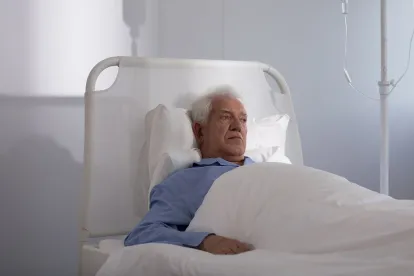In its FY 2020 proposed hospice update, CMS proposes two changes of significant interest to providers:
-
Shifting $500 million of reimbursement from routine to enhanced care levels; and
-
Requiring providers to notify patients in writing of treatments that will be deemed “unrelated” to the terminal illness (and therefore still covered by Medicare separately).
Given that both of these topics deserve significant attention, we will address them in separate posts. This first post covers the notice of unrelated treatments.
In recent years, CMS has claimed that “virtually all” treatment (drugs or services) a terminally ill patient requires should be deemed “related” to the terminal illness. CMS has claimed that Part D insurers, for instance, have covered millions of dollars of medications for admitted hospice patients that should have been paid for by hospices.
If treatment is related to the terminal illness, and palliative not curative, the hospice must provide it as part of the hospice benefit. If, however, treatment is related, but curative in nature, then by electing hospice, the patient waives such treatment. By contrast, if certain treatment (such as diabetes medications for a cancer patient) is deemed unrelated to the terminal illness, then a patient can obtain such treatment through the regular Medicare benefit while on hospice.
CMS notes that patients can be surprised that some treatments are not covered by hospice. In the name of “patient rights,” CMS proposes to require hospices to advise new patients of the right to receive written notice (called an addendum to the notice of election) specifying any treatments that hospice believes are “unrelated” to the terminal illness and that, therefore, will not be covered under the hospice benefit.
The real purposes of this proposal appears to be three-fold: to decrease Medicare expense for “unrelated” drugs and services; to require hospices to broadly enforce a patient’s waiver of right to “curative” treatments (perhaps in turn deterring some use of hospice); and, finally, to set up strong audit rights for CMS against hospices.
If requested by a patient, the proposed addendum will need to include a “written clinical explanation” in plain language detailing what treatments will be deemed unrelated and why.
CMS proposes to require this addendum to be delivered within 48 hours of request on admission or immediately if requested during the course of treatment. Both proposed timelines are unrealistic. Patients elect hospice, doctors certify eligibility, and only then does the IDG, within 5 business days, make a comprehensive assessment of patient needs. The 48-hour rule would dramatically compress admission workflow and force hospices to recognize, almost instantly, any unrelated treatments.
CMS proposes to make both the provision of notice of right to receive the addendum and, if requested, the provision of a satisfactory addendum, conditions of payment. When framed as conditions of payment, it sets up the right for CMS and its auditors to deny all reimbursement (or recover all reimbursement in a post-payment audit) if the requirements are unmet.
CMS has not promised to limit such audit denials/recoveries (what we call “forfeitures” in civil law) to cases where there is actual harm to the patient (surprised that some treatment is unrelated) or harm to Medicare (where Medicare actually incurs treatment expense outside of hospice for a patient on the benefit). Although the issue of incremental expense to Medicare is relatively rare, the audit rights on this point could be applied to all patient claims.
CMS’ proposal is not without irony when framed as a “patient’s rights” issue: If certain treatment is deemed unrelated, patients have an unequivocal right to receive such treatment, at their election, under regular Medicare. By contrast, if certain treatments are deemed related, and curative not palliative in nature, then patients electing hospice may not be able to receive such treatment at all. In one sense, this proposal will force hospices to play the bad guy: deny hospice patients certain treatments, even if arguably unrelated to the terminal illness. For CMS to suggest that this is, then, a patient rights issues is a bit misleading.
Although framed as optional at the patient’s request (i.e., don’t blame CMS for this), in practical terms, providers may be better served to regard this addendum, if adopted, as mandatory.
Consider: If a hospice offers to provide an addendum of unrelated treatments, will a patient or patient representative ever refuse? And, if one does refuse, how will the hospice document that fact so as to avoid audit risk on that question? This author’s advice may be to provide the addendum to all patients (and abandon the CMS ruse of patient choice in the matter).
Given that the vast majority of patients have no “unrelated” treatments, by providing an addendum that says just that in most cases, hospices will mitigate audit risk. If there is a patient with an unrelated condition, such as a lung cancer patient with a broken leg, then by providing the addendum, the hospice will protect itself against specific audit risk on that claim. If the addendum is not provided in such a case, CMS auditors might try to put all expense on the hospice.
Of course, by creating a set of addenda with lists of unrelated conditions and treatments, a hospice thereby exposes itself to audit risk as well. CMS may demand to see all such addenda; and, reviewing them, CMS, or its auditor, may decide that it disagrees with a hospice’s approach to certain treatments. CMS may then regard certain addenda as “deficient” and demand refunds for that foot fault alone.
As with the basic conundrum of hospice eligibility (is a patient with a particular set of conditions likely to pass away in six months or less?), CMS could itself set up National Coverage Determinations specifying what is related or unrelated to certain terminal diagnoses. CMS refuses to take up the task. Instead, CMS leaves this second thorny question to the judgment of each hospice. Given its choice to burden providers with this assessment, CMS should accord deference to such determinations; however, that is unlikely (de novo review seems more likely).
Any way you look at it, this proposal will cabin more patient expense and impose more risk on hospices.
Hospices, and those that would advocate for them, should comment on this proposed rule asking CMS:
-
To consider whether the true extent of expense from and occurrence of “unrelated” treatments justifies a general requirement like this (as a percentage of the hospice program and as a percentage of the number of patients receiving hospice);
-
To include a more honest assessment of the regulatory burden this addendum will put on hospices. (MedPAC and CMS bemoan the growth of for-profit hospice providers, but ever-increasing regulatory burdens and audit risks can in fact only be met by well-organized institutional providers (and not stand alone non-profits));
-
To provide reasonable time for providers to complete the addendum. 48 hours after election is not enough time for a hospice to identify all unrelated treatments; and, a hospice certainly cannot provide such an addendum immediately during the course of service. 7 calendar days would be a minimum amount of time to allow in either case. CMS has identified no exigency requiring a more immediate turn around;
-
To promise not to use the addenda requirement to deny reimbursement unless there is a nexus between the violation and identifiable harm either to the patient (very unlikely) or to Medicare (unlikely as well). If there is no harm, there should be no potential forfeiture of reimbursement;
-
To acknowledge that, given that CMS is leaving the determination of unrelated treatments to the discretion of providers, CMS will defer to hospice judgments on these matters, unless clearly erroneous; and
-
To confirm that hospices may revise the addendum, without penalty or presumption, as circumstances require (for instance, when they learn new information about a patient or when a patient’s condition changes). Hospices are not omniscient; CMS should acknowledge this fact.
A copy of the FY 2020 Hospice Wage Index, including these proposed changes, may be found here.
Comments on this proposed change must be submitted to CMS by June 18, 2019 (methods detailed in the proposed rule).



 />i
/>i

